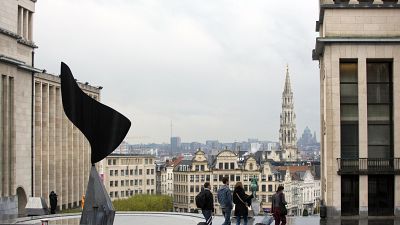Hans von der Brelie of euronews interviewed Estonian Prime Minister, Andrus Ansip. The Liberal politician leads a governmental coalition with Conservatives. He is the chairman of the “Reform Party”, which is centre-right, and free market-oriented. Ansip steered Estonia towards the Eurozone. Today sixteen countries use the euro. On first of January next year, Estonia will join the European single currency. The Estonian Euro coins depict the country’s silhouette.
Hans von der Brelie, euronews:
“You will get the Euro soon, while other countries in Central and Eastern Europe are trying to postpone the introduction of the European single currency. Why you are rushing for this new money?”
Andrus Ansip:
“We believe here in Estonia that the Euro will definitely support trade with other EU Member States. 70% of our exports go to other EU-Member States. And the Euro will definitely support trade. The Euro will make Estonia even more attractive for foreign direct investments. 70 % of all foreign direct investments come from neighbouring countries -Sweden and Finland – and investors in those countries cannot trust those small national currencies… They trust the Euro much more as a strong currency.”
euronews:
“Preparing your country to be able to join this European single currency, actually you applied quite tough economic measures. And having a snapshot of today’s country: 20% of the population is poor or very poor. Isn’t this a price too high to pay for this European single currency?”
Andrus Ansip:
“We have to go on with a conservative fiscal policy anyway. Really high price, people they have to pay if the deficit will be really high because price of credits is quite high today for those countries (such as Greece) where deficit is high. Estonia was quite well prepared for this international financial crisis. During those (preceding) really good years, we collected quite remarkable reserves to our country. We used to pay back our governmental sector debts and now it show that we still have in our governmental sector reserves approximately ten percent reserves, ten percent of our GDP. And the level of governmental sector debts in Estonia is the lowest one in the European Union: 7.2% only!”
euronews:
“Having a look on this city, just there, on the other side, we have a neighbour, a neighbour of the European Union, and this neighbour is Russia. The EU is struggling a little bit to define a clear policy towards Russia. What is the Estonian input? What kind of future relationship should the EU have with Russia?
Andrus Ansip:
“Of course, Russia wants to have visa freedom with the whole European Union. But first, they have to fulfil certain criteria…”
euronews:
“Which are?”
Andrus Ansip:
“They have to take back all those people who used to travel illegally abroad. They have to give to all the citizens travel passports. Today, it is so that not all Russian citizens have those travel passports, and of course, I think it is not normal when EU citizens they have to register in Russian towns when they are travelling in Russia.”
euronews:
“Roughly one third of the population here in Estonia is native Russian speaking. Why not just accept Russian as a second official language? This would take out tensions, because actually we saw quite some frictions here in Estonia between Russian and Estonian speaking communities…”
Andrus Ansip:
“Our state language is Estonian language and everybody has to learn our state language here in Estonia.”
euronews:
“Talking to Russian speaking Estonians here, or talking to Russian speaking residents here in Estonia, I hear sometimes quite some harsh critics: people saying they are living in a kind of “apartheid system”…
Andrus Ansip:
“I do not think it is really true.”
euronews:
“So go ahead: why not? They (Russian speakers in Estonia) are saying we have problems to get a job, we have problems to get a passport.”
Andrus Ansip:
“Well, during the crisis, I don’t think it is easy to get a new job. In London, in New York City or in Beijing: it is difficult everywhere and it is the same here in Estonia…”



